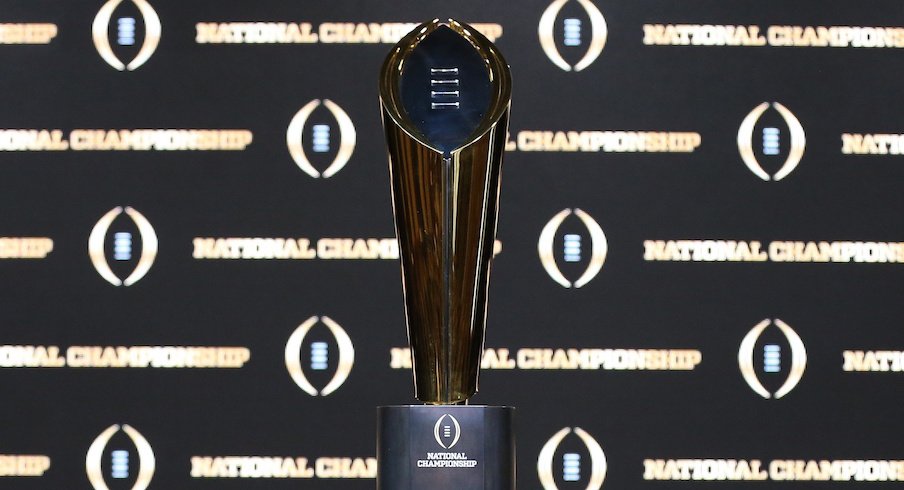Since UCF defeated Auburn in the Peach Bowl to finish its season undefeated – and subsequently claimed a national championship for itself, even though it was left out of the College Football Playoff – the hottest debate in college football has been whether the playoff should be expanded to eight teams.
The question also came up before the Cotton Bowl because both teams in that game, Ohio State and USC, were left out of the playoff despite winning their respective Power 5 conferences.
In a year where two teams from the same conference are set to play for the actual national title, while two Power 5 conference champions and an undefeated team didn’t even get a shot to compete for it, there’s a clear argument that continued postseason reform – specifically, a playoff expansion – is necessary.
There’s a number of hurdles in the way, however, that could make it difficult for that to happen.
On the surface, an eight-team playoff seems like the natural next step in the evolution of the Football Bowl Subdivision’s postseason system. An eight-team playoff with guaranteed bids for the five Power 5 conference champions and the top Group of 5 team, leaving only two at-large teams, would still place a premium on winning while increasing the emphasis on conference titles. It would give all of college football more to compete for, while largely eliminating the possibility of a team being left out of the playoff and having any legitimate argument that it is a better team than the playoff winner.
The problem with an eight-team playoff is that it would add another game to the schedule, meaning that the teams who meet in the national championship game would end up playing 16 games, a possibility that most coaches – with the interests of their players at heart – are likely to be opposed to.
"I think the thing to always keep in mind is there’s really one group that really counts and that’s the players," Ohio State coach Urban Meyer said prior to the Cotton Bowl. "You start extending this thing, and you’re starting to talk about adding one more game and it’s not just another game, it’s two sledgehammers going at each other. So I don’t see where that calendar would work. I don’t see it happening."
From a calendar standpoint, the problem isn’t just the toll that an extra game would place on players’ bodies, but the fact that there simply isn’t a good time for those games to be played. While there are currently typically about four weeks between the conference championship games and the playoff semifinals, those first two weeks are typically reserved for players taking final exams and coaches going on the road recruiting, the latter especially so now with the advent of the Early Signing Period.
Even with the possibility of playing the first-round games at the home sites of the top four seeds, and making the first-round games more like regular games than bowl games from a scheduling and travel standpoint, finding a sensible slot for those games on the current schedule could prove difficult.
“You start extending this thing, and you’re starting to talk about adding one more game and it’s not just another game, it’s two sledgehammers going at each other. So I don’t see where that calendar would work.”– Urban Meyer
The step that would potentially need to be taken to make an eight-team playoff happen, in order to both open up space on the calendar and assuage concerns about the tolls on players’ bodies, would be to either shorten the regular season to 11 games or eliminate conference championship games. Neither of those solutions, however, would be ideal.
Shortening the regular season to 11 games would mean one of two things: the end of marquee home-and-home non-conference series during the regular season, or programs like Ohio State playing only six home games instead of seven. The latter would mean a significant loss in revenue for college football’s top programs, while eliminating made-for-TV matchups in September certainly wouldn’t help college football’s bottom line either.
Conference championship games are money-makers, too, and eliminating those would not only offset the revenue gains of an expanded playoff, but also leave more doubt about which team(s) belong in the playoff from each conference.
An eight-team playoff would certainly be a money-maker in itself, and if there’s one thing we should know to be true in the world of college football, it’s this: If there’s a way for the institutions who run the show to make more money, they’ll take advantage of it. An eight-team playoff certainly won’t happen, however, if it comes at the expense of losing more money elsewhere on the schedule.
Either way, a change to the current playoff structure is not imminent, according to College Football Playoff director Bill Hancock, who told Sporting News’ Bill Bender that the four-team playoff will remain in place until at least 2025, which is when the current 12-year agreement expires.
"It would take a unanimous vote from all the conferences for that kind of movement to start," Hancock said. "Right now, that's not in the cards."
Presumably, athletic directors and other NCAA leaders will discuss the theoretical possibility of an eight-team playoff nonetheless, because of the opportunities it could provide to generate more revenue if done correctly. There’s enough logistical road blocks standing in the way, however, to make it a debate that goes far beyond how it would affect the competitive structure of college football, but how it could be implemented in a way that benefits all parties involved.


